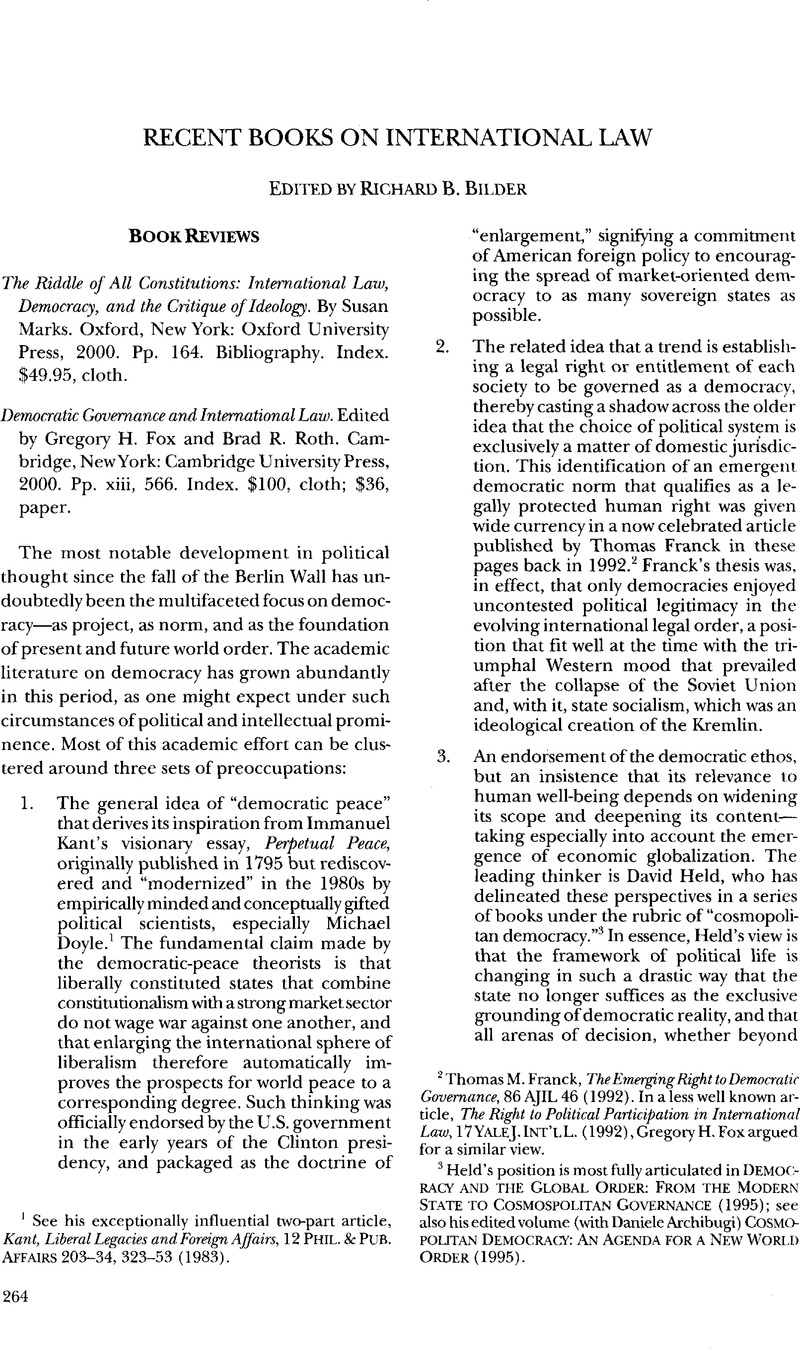Article contents
The Riddle of All Constitutions: International Law, Democracy, and the Critique of Ideology. By Susan Marks. Oxford, New York: Oxford University Press, 2000. Pp. 164. Bibliography. Index. $49.95, cloth. - Democratic Governance and International Law. Edited by Gregory H. Fox and Brad R. Roth. Cambridge, New York: Cambridge University Press, 2000. Pp. xiii, 566. Index. $100, cloth; $36, paper.
Published online by Cambridge University Press: 27 February 2017
Abstract

- Type
- Recent Books on International Law
- Information
- Copyright
- Copyright © American Society of International Law 2002
References
1 See his exceptionally influential two-part article, Kant, Liberal Legacies and Foreign Affairs, 12 Phil. & Pub. Affairs 203–34, 323–53 (1983).
2 Franck, Thomas M., The Emerging Right to Democratic Governance, 86 AJIL 46 (1992)CrossRefGoogle Scholar. In a less well known article, The Right to Political Participation in International Law, 17 Yale J. Int’l L. (1992),Gregory H. Foxargued for a similar view.
3 Held’s position is most fully articulated in Democracy and the Global Order: from the Modern State to Cosmospolitan Governance (1995); see also his edited volume (with Daniele Archibugi) Cosmopolitan Democracy: An Agenda for a New World Order (1995).
4 My main efforts along these lines are contained in On Humane Governance: Toward a New Global Politics (1995), Law in an Emerging Global Village: A Post-Westphalian Perspective (1998), and Predatory Globalization: A Critique (1999). It is true that none of these books takes on directly the challenge posed by embedding democracy in international law so as to have a progressive impact. Focusing on humane governance is my way of arguing that market-oriented ideas are not integral to globalization, and that a more people-oriented globalization would allow advantage to be taken of technological innovations and global integration, while more successfully addressing issues concerning the inequality of benefits and the reduction of poverty.
5 It seems evident that Marks’s use of, and approach to, “inclusionary democracy” is similar in intent, but different in derivation and justification from, reliance on the same terminology in a recent book by Terrence Paupp, Achieving Inclusionary Democracy: Advancing Peace and Development in First and Thiri) World Nations (2000). Because the two books were published so close together, it seems clear that neither author was aware of the other’s work.
6 For innovative thinking along the same lines see, Matván Clech Lam, At The Edge of The State: Indigenous Peoples and Self-Determination (2000).
7 See , for example, Baxi, Upendra, The Future of Human Rights (2002)Google Scholar; Bello, Walden F., The Future in The Balance: Essays on Globalization and Resistance (Mittal, Anuradha ed., 2001)Google Scholar; Davutoglu, Ahmet, Civilizational Transformation and the Muslim World (1994)Google Scholar; Muzaffar, Chandra, Human Rights and the New World Order (1993)Google Scholar; and Onuma, Yasuaki, Towards an IntercivilizationalApproach to Human Rights, in The East Asian Challenge for Human Rights (Bauer, Joanne R. & Bell, Daniel A. eds., 1999)Google Scholar.
8 See , for example, works by Held, supra note 3; Kaldor, Mary, New and Old Wars: Organized Violence in a Global Era (1999)Google Scholar; and Linklater, Andrew, The Transformation of Political Community: Ethical Foundations of the Post-Westphalian Era (1998)Google Scholar.
- 1
- Cited by


